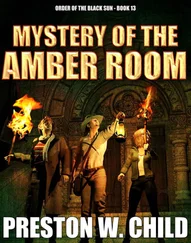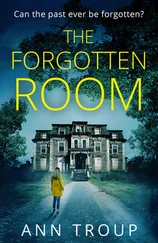She stood up. “He let go then. I ran behind my desk, picked up the phone, dialed the front desk, then Dr. Olafson’s office. A minute later, three lab assistants burst in and hauled Willard away. He was yelling and screaming at the top of his voice, kicking violently... and that was the last I ever saw of him.”
She turned back now and sat down again at her desk, breathing heavily.
“Thank you,” Logan said.
She nodded. A brief silence descended over the room.
“Please tell me something,” Mykolos said at last. “They say he committed suicide. But I don’t believe it.”
Logan said nothing.
“Please tell me. How did he die?”
Logan hesitated. The information, he knew, was being kept as quiet as possible. But this woman had helped him, to her own discomfort. “It isn’t supposed to be known.”
“I’m not going to tell anyone.”
Logan looked at her appraisingly. Then he said, “He used the heavy windows of the visitor’s library to decapitate himself.”
“He—” Mykolos’s hand flew to her mouth. “How awful.” Then she balled the hand into a fist. “No,” she said. “No, that couldn’t have been Willard.”
“What do you mean?”
“Something was obviously not right with him. He might have been sick — I don’t know. But he would never, ever have killed himself. He had too much to live for. He was the least rash person I’ve ever known. And... dignity was important to him. He would never have killed himself — especially not in that way.”
This brief speech was remarkably similar to what Olafson had said — and it was delivered with the same passion. “That’s why I’m back here,” Logan told her. “To try to understand what happened.”
Mykolos nodded a little absently. Then she glanced at him. “What do you mean: back here?”
“About ten years ago, I spent six months at Lux, doing research of my own.”
“Really? Six months is an odd length of time. Usually, research terms are measured in years.”
Logan regarded her again. Something about this young woman convinced him he could trust her — and that, in fact, she might be able to help him in ways he could not yet know. “I was asked to leave,” he said.
“Why?”
“You know Lux’s record as the nation’s oldest think tank. The respected position it holds among its peers.”
“You mean, we’re all a bunch of tight asses.”
“Something like that. My work was adjudged to be inadequate. Not true science. Not intellectually rigorous enough. It was seen by some as hocus-pocus, smoke and mirrors. A cadre of Fellows, headed by Dr. Carbon, had me forced out.”
Mykolos made a face. “Carbon. That prick.”
“Well, I’m back here now. This time, as an investigator instead of a Fellow.”
“Dr. Logan, I want — I need — to know what happened. If I can help in any way, let me know.”
“Thanks. You can start by letting me putter around in Dr. Strachey’s office, if you don’t mind.” And Logan indicated the far office.
“Of course. It’s a bit of a mess, though. Let me go in ahead of you and clear things up a bit. I wouldn’t want you to do an Alkan on me.”
“A what?”
“Charles-Valentin Alkan. French composer. Wrote some of the strangest music you’ll ever want to hear. Supposedly died when a bookcase fell on top of him.”
“Never heard of him. You’re quite the Renaissance woman.”
“I guess the Lux talent spotter thought the same way.” And Mykolos rose from her desk with a wan smile. “Come on — follow me.”
Willard Strachey’s private apartment — his “rooms,” in Lux parlance — was on the third floor of the mansion, just a dozen or so doors down the Lady’s Walk from where his office was located. Logan let himself in with a key provided by Dr. Olafson, closed the door behind him, let his bag drop to the floor, and stood still a moment, taking in the feel of the space beyond. It was just past nine p.m., and the chamber was dark, its furnishings mere dull shapes. After about a minute, Logan turned on the lights.
He hadn’t known what to expect, and the room he was standing in — apparently a combination library and parlor — was a pleasant surprise. The furniture was upholstered in mahogany-colored leather, well lived in and equally well cared for. One wall contained recessed bookcases which — Logan noted — were devoted to a wide variety of subjects: nineteenth-century English novels; Latin classics in translation; a few recent whodunits; biographies; and numerous books on sailing, architecture and design, and the history of computing. The books were not just for display: Logan pulled a few from the shelves and found them to be lovingly read. Several displayed marginal glosses in Strachey’s small, meticulous hand. The Edwardian trappings of the mansion had been tastefully accentuated in this room by a hundred additional touches — vintage sconces, Astrakhan carpets, oil paintings of the English romantic school. There was an old mechanical doll; a vintage wooden radio; a worn sextant — apparently, Strachey was a collector of antique technology. A rolltop desk sat in one corner, with several old fountain pens lined up at one side. Another corner was monopolized by a Steinway Model B, its glossy black finish shining in the mellow light. The room exuded the warm, welcoming feeling of a London gentleman’s club from the turn of the last century. It had taken money to create this atmosphere — Olafson said money wasn’t a problem for Strachey. But it had taken more than that: it had taken time, and patience, and loving care. It was subtle; it was refined; it was delightful. Logan could imagine himself living in a place such as this.
He moved through the rest of the apartment. It was not especially large — a dining room, a compact but expensively supplied kitchen, a bathroom, a bedroom — but each space displayed the same care and consideration as the library had. Nowhere did Logan find any evidence of Strachey’s work: that was left in his office, down the hall. Rather, these rooms were devoted to private relaxation with the man’s many avocations: sailing, art, industrial design.
Logan had spent almost the entire afternoon in Strachey’s office, going through his papers, notes, manuscripts, sometimes on his own and sometimes with the assistance of Kim Mykolos. It had been as expected: there were clear signs that the pace of Strachey’s research had been slowing. But as Mykolos had told him, the man had been in essence sealing the cap on a lifetime career, and greatly enjoying the process. Nowhere among the man’s various notes and writings was there any indication of disappointment: just quiet satisfaction at having made significant accomplishments in his field. Logan now felt certain that, whatever might have prompted Strachey’s suicide, it had nothing to do with the twilight of his career.
There had also been several large folders in the office relating to the West Wing renovation, and — feeling overwhelmed — Logan had packed these up and sent them back to his own rooms for later examination. He had then gone to speak with Lux’s doctor in residence. The two spent twenty minutes going over Strachey’s physical and psychological history. As Olafson had indicated, all tests and examinations showed Strachey to have been in excellent health for a man of his age, emotionally stable, with no indications of either preexisting conditions or future complications.
Now he returned to the parlor. He’d held out mild hope that Strachey had kept a diary or private journal, but there was no sign of any. So instead he reached into his duffel, removed the video camera, and made another tour of the apartment, filming each room. Replacing the camera, he took out a small notebook and a rectangular device about the size of a police radio, with a control knob centered at the bottom and a large analog gauge monopolizing the top: a trifield natural EM meter. He made yet another tour of the apartment, carefully watching the needle of the meter and making occasional jottings in his notebook. Finally, he pulled another handheld device from the duffel, studded with knobs, toggle switches, and a digital readout: an air-ion counter. He took several readings, but found the air ionization to be no different from that of the other areas of the mansion he’d sampled already.
Читать дальше












